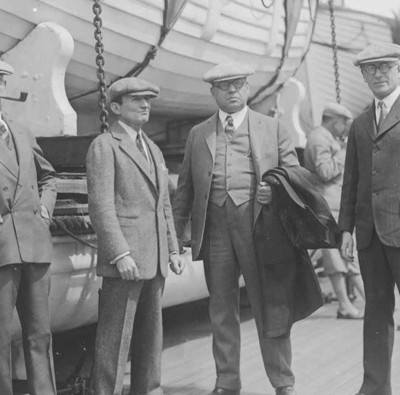
In April 1928, Walter and Mollie May took 63 friends on a trip to Paris. The occasion was their silver wedding anniversary. The Mays paid for travel, lodging, meals, entertainment and amenities. By one estimate, the party cost $100,000 — approximately $1.4 million today.
Walter May (1874-1943) was president of the May Drug Company, which his father had started in 1894, after emigrating from Germany, peddling in Ontario, prospecting in British Columbia, and wholesaling dry goods in Williamsport, Philadelphia and Pittsburgh. Walter May was an engineer by training but joined the company about 1900 and assumed the presidency when his father died in 1921. He took the company public in 1927. By the time of the party, May Drug Company was one of the largest chains in the country. Mollie Brilles (1873-1950) was born in Cadiz, Ohio. She moved to Western Pennsylvania in the 1890s, when her father started a cigar factory in old Allegheny City.
By all indications, their wedding was a typical affair for upper class Jews of the time. They held the ceremony on April 27, 1903, at the Concordia Club, in old Allegheny City. The assembly room of the club was decorated in ascension lilies, palms and ferns. The bride wore a white chiffon gown and a veil fastened with a wreath of orange blossoms and carried a bouquet of lilies of the valley. Rabbi J. Leonard Levy of Rodef Shalom Congregation officiated the service.
Many guests of the anniversary party had previously been guests at the wedding, including Horace Gallinger, who had been an usher. Among the other anniversary party guests were Max Blum, Eleanor Benswanger and Rabbi Samuel Goldenson of Rodef Shalom Congregation.
The party began with several voyages. The Pittsburgh contingency left for New York by train on April 17, 1928. Each guest or couple had a private berth on special cars provided by the Pennsylvania Railroad Corporation. The train arrived at Penn Station the following morning, and the party convened across the street at the Pennsylvania Hotel for lunch and a nap before boarding the RMS Aquitania that evening. Each guest or couple had an outside stateroom for the journey to Cherbourg, France. A team of newsreel cameramen traveled along, filming guests arriving, playing shuffleboard on the main deck and driving through the streets of Cherbourg.
In addition to covering railroad fare, steamship expenses, transportation from Cherbourg to Paris, taxis, hotel accommodations, meals and laundry, the Mays also gave each guest $100 (approximately $1,400 today) to cover unforeseen expenses and brought a stash of American telephones, which were considered easier to use than their French counterparts, to allow each guest to make long distance calls to loved ones back home. Concierges arranged theatre tickets, and guides escorted guests on daytrips to World War I battlefields, the Palace of Versailles and the field where Charles Lindbergh had landed after his transatlantic flight, among other sights.
The event attracted the attention of reporters. International wire services covered the trip in detail. A local report called it “one of the most unique and costly entertainments ever held in the history of Pittsburgh.” The centerpiece of the trip was an anniversary banquet at the Grand Hotel in Paris on April 27, 1928. “The menu of last night’s banquet was worthy of the day of Louis XIV and for those who chose there were wines bottled before Pittsburgh had been chartered as a city,” the Associated Press wrote. The meal culminated in a concert, where guests entertained one another with songs composed in honor of the couple at their wedding.
Guests remained in Paris for a week after the banquet, which left time for unexpected celebrations. Walter May Jr. used the setting as an opportunity to marry his fiancée Florence Lebowitz. Horace Gallinger gave away the bride. The guests also thanked their hosts by endowing a bed in their honor at Montefiore Hospital and by commissioning a special tribute book to the anniversary couple.
The Jewish Criterion was conspicuously quiet during the month-long trip. In May 1928, after the guests had returned to the United States on the RMS Berengaria, Charles Joseph, the editor of the local newspaper, finally addressed the matter. “It’s their money and the party is their business, not ours,” he wrote. “I personally think the Mays showed imagination plus great generosity. Some folks say they would rather have spent the money, such an immense sum, some other way. Well, no one is stopping them. But they surely cannot expect someone else to think and to do as they think and do.” His only criticism, he added, “is that the May party was badly press-agented because the character of the publicity trespassed on good taste, but knowing Mr. and Mrs. Walter May, both of whom are unassuming and modest, the blame cannot be laid at their door.”
Walter May retired in 1929 after his family sold their company to the Liggett Drug Company.